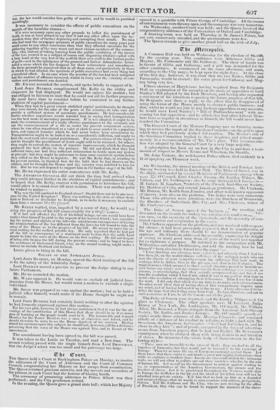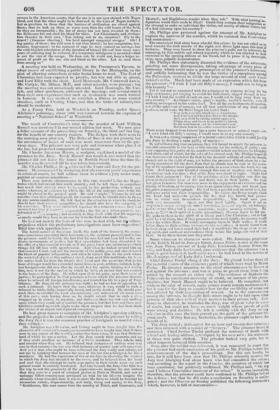On 1Vednesday, the annual meeting of the British and Foreign
Anti- Slavery Society NS as held in Exeter I fall. The Duke of' Sussex was in the chair, surrounded by several Men il,ers of 1'41.1i:intent ; among whom were ;Is, O'Connell, Lord Charles Fitzroy. Sir Earulley Wilmot, Mr. Villiers, and !dishing-ton also by some distinguished foreigners— M. Cuizot. M. lsambert, sesretary of the French Anti-Slavery Society, Dr. 1■faddoly of Cuba, and several Amerieao gentlemen. Mr. t'larkson, Mr. Buxton, Mr. Knibb from Jamaica, and other well-1 nown opponents oh' slavery, were also on the platfOrm. The ladies were very numerous. Those who attracted most attention, were the Dutchess of Brunswick, the Dutchese of Sutherland, Mrs. Fry, and Mrs. Clarkson, widow of Mr. Clark...011's son.
The Duke of Sussex open ..1 the bur lies r and
the meet11,1°,' descanted on the benefit the sock:Viva:ea icula ed to confer on
can race, on the enormity of the s;ave-tfade, and the necessity of con- tinued exertion and coOperation in the cause. Mr. Clarkson appeared on the platform, and was received with respect- ful silence : it had been previously requested. that in consideration of his age and infirmity there should be no demonstration of popular applause, Mr. Clarkson addressed the as-middy. expressing his delight at seeing so many good men from all parts of the world met together for so righteous it purpose, Ile referred to his cobperation with Mr. 'Wilberforce and other Abolitionists, and told the meeting how lie had himself " been absolutely forced into the cause "- " I was thinking one morning, more seriotHly mid solemnly than I had be-
fore thought, on the multitudinous sun', of the unhappy people who are now the objects of your sympathy—upon the sufferings they were made to undergo, first in Africa, then in the passage, and then in the Colonies. The tragical scenes which occurred in those several situations passed in horrible re- view before my mind; anti my comp&,,ion for their sufferings v:as sl great, so intense, so overwhelming, that they actually overpowered me, and forced me into the resolution which I dared not, which it was at my peril at that time to resist—the resolution of attempting their deliverance. Thus I was ffireed into the work. I did only that which was my duty to do under such circumstances. No other merit than that of having obeyed this extraordinary impulse upon my mind, and of having followed it up is due to mite, I have olive dared to in, &lige the hope that this feeling came from God. To him, therefbre, and not to such a creature as I ant, be all the honour and all the glory.
The Duke of Sussex soon departed ; and Sir Eardley Wilmot took his place as Chairman. The other speakers were M. Isamhert. Judge Birney of New York, Dr. Lushington, Mr. O'Connell, Mr. William Allen, Mr. Remond, a Negro delegate from the American Anti-Slavery Society, Mr. Knibb, and Justice Jeremie. Mr. O'Connell's speech oc- cupies nearly three columns of the Aforning Chronjcle ; and consisted chiefly of a defence of his conduct in refusing to light a duel with Mr. Stevenson, the .1merican Ambassador—" Cod had forbidden it. and he chose to obey him " ; and of proofs, extracted in the forum of advertise- ments from American papers, that he had not libelled Mr. Stevenson's countrymen when lie charged them with being dealers in and breeders of slaves. He denounced the whole body of slave-owners in the fol- lowing style-
" These men are insensible to the curse of' God; they are dead to all the impulses of humanity; but they would not be insensible to the contempt of Europe. Then let us raise the cry of European contempt against them. Let them know that there exists in our minds a great and mighty distinction—that while we embrace as brothers those Americans who would abolidi this infamous trade, we will not allow to pollute our soil those wretches who live by the sale of human life. Let us call on the Government to protest against sending to us, as representatives of the American Government, the owners and the breeders of slaves. Let it he proclaimed throughout the Western world, that in Europe the trafficker in the life and the blood of his fellow num will not be admitted into private society. Tell him that we look on him as a degraded and accursed thing—that we would as soon associate with robbers, pickpockets, thieves. Tell Mr. Calhoun and Mr. Clay, who are now striving for the office of President, they who can be found to support the interests of the slave-
owners in the American senate, that the one is in our eyes stained with Negro blood, and that the other ought to be drowned in the tears of Negro mothers. Let us proclaim to them that the barriers of civilization are closed against them; that we look on them as worse even than the wild beasts of the field, for they are irresponsible; the law of mercy has not been revealed to them ; the Redeemer has not shed his blood for them. Let Christianity and civiliza- tion thunder in their ears, ' You belong not to us, monsters! Fly to the desert ! (Immense cheering.) Go herd amongst congenial savages.' Oh! I beg pardon of them ; the wild man is not thus brutal ; he has compassion, ten- derness, forgiveness : in the moment of rage lie may commit an outrage, but the cold-blooded calculation of the duration of human life—of how many more pars of suffering may lie endured, if a temporary indulgence is accorded—that is not the vice of the savage. lie does not, he could not, keep a ledger zee- count of profit on the one side and blood on the other. Let us send them from among us."
A meeting was held on Wednesday, at the Freemason's Tavern, to adopt means of establishing a public library in the Metropolis, on the plan of allowing subscribers to take books home to read. The Earl of Clarendon had been .expected to preside, but was not able to attend, and Lord Eliot took the chair. Lord Monteagle, Mr. Cornewall Lewis, Mr. Carlyle, Mr. Milnes, M.P., and other notables, were present ; but the meeting was not numerously attended. Lord Monteagle, Mr. Car- lyle, and other gentlemen, addressed the meeting ; and several stated from their own experience that such an institution was much wanted in London. It was resolved to establish a library in some central situation, such as Charing Cross, and that the tern's of subscription should be moderate.
At a Fancy Fair, held at Woolwiele on Tuesday, under Queen Adelaide's patronage, about 5001. was received towards the expense of erecting a " National School" at Woolwich.



























 Previous page
Previous page